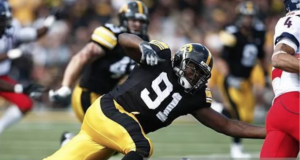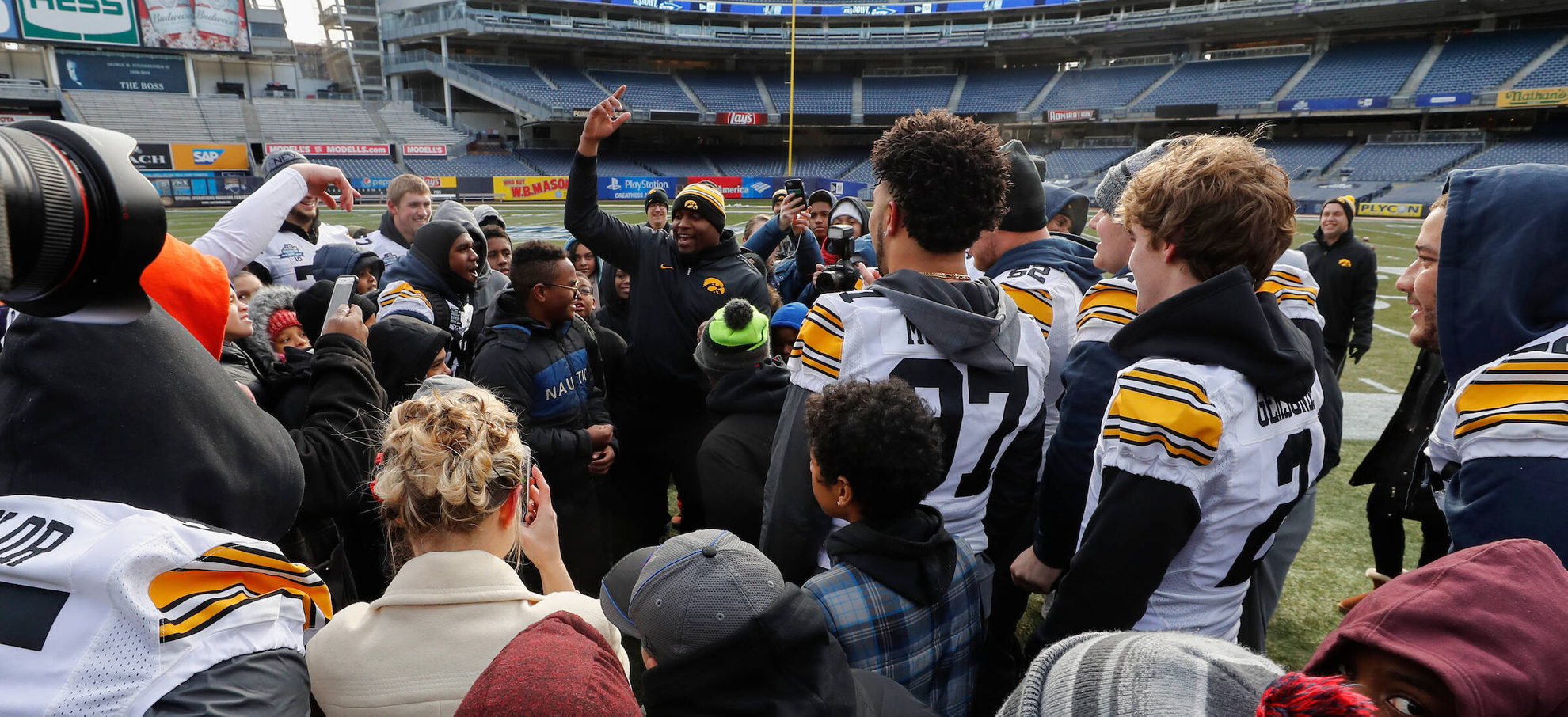Broderick Binns ready to lead a cultural revolution within UI athletics
By Pat Harty
IOWA CITY, Iowa – Broderick Binns in many ways epitomizes the American dream.
The former Iowa defensive end didn’t get to enjoy a long and prosperous career in the NFL, which was his childhood goal and ambition, but he had a fallback plan, which was to take advantage of his education.
And now that education has put Binns in a position of major influence as he was recently named the Executive Director of Diversity, Equity and Inclusion for University of Iowa athletics.
The position is new and was created in response to the multiple accusations of racial disparities in the Iowa football program by former black players.
The 31-year old Binns, who is black and married, and the father of two young children, has a daunting task in front of him as he tries to help create a healthier and a more receptive and understanding environment for UI student-athletes, both black and white.
He had served as Director of Player Development for the Iowa football team since 2016 before taking this new position.
“My responsibilities are to make sure that our student-athletes feel like they belong on campus, and when they get on campus, make sure they can be their true, authentic self and they don’t have to wear a mask,” Binns said Wednesday on the HawkFanatic/KCJJ radio show and podcast. “And that’s kind of what we’re dealing with the whole Iowa football thing.”
Binns will work with student-athletes from all sports, but football will be a priority, given the current circumstances, the size of the roster and the number of blacks on the team.
Many of the former black players said they were stripped of their identity when they joined the Iowa football program, and forced to conform to a culture that was dominated by the power and influence of white people.
“Some of the things that I want to get started with right off the bat is make sure that all student-athletes, not just our black student-athletes, but all student-athletes, feel like they have a voice and that their voice is being heard,” Binns said. “I think the reason why this happened the way it did with football is because some of our student-athletes and the alumni felt like they could never air out any of their grievances. They felt like they didn’t have a voice to in act change, or felt like their voice didn’t matter.
“And so moving forward, because I, obviously, was on the football staff and I experienced that, I don’t want that to ever happen again within Iowa athletics.”
Binns said Wednesday that he was surprised when former Iowa center James Daniels posted on Twitter in early June that there were racial disparities within the Iowa football culture.
Daniels’ tweet came barely a week after George Floyd was killed on May 25th in Binns’ hometown of Minneapolis.
Floyd’s controversial death launched a national civil rights movement that created an environment in which Daniels felt empowered to air his grievances publicly.
Life hasn’t been the same since, with Chris Doyle having been relieved of his duties as the Iowa football team’s strength and conditioning coach after 21 years on the job, and with Binns now laying the foundation for his new job in leadership.
“I was definitely surprised when he tweeted,” Binns said of Daniels. “But every former player that has given their story or gave their recounts of their experiences at Iowa, I definitely commend them, and I’m proud of them that they finally felt like they had a voice, or the opportunity to kind get the grievances that they had off their chest. Some of my teammates, I remember, put things out there and talked about their experiences.
“And clearly, just ten years of holding on to stuff, or five years, or whatever it is, I think it’s good for guys to get that off their chest. So when James did that it was definitely a shock to me. I didn’t not know that was coming that way.”
Binns didn’t try to sugar coat anything during Wednesday’s 30-minute interview, or make any excuses.
He understands that the Iowa football culture won’t change in a matter of months, or just because some changes in policies and procedures have occurred.
The hard part of changing the culture is just beginning.
“I think the changes that they have done thus far are kind of the smaller, easier changes, whether it be giving Twitter back, or whether it be changing the policies or procedures or rules within the team, to me, that stuff is easy,” Binns said. “What we are trying to create is a long-lasting effect, long-lasting changes.”
Iowa head coach Kirk Ferentz has seen his once-proud legacy tarnished by the accusations of racial disparities. Ferentz, who turned 65 years old on Aug. 1st, has admitted to having a blind spot where Doyle was concerned, but Ferentz is also determined to fix what needs fixed from a culture standpoint.
“I’m more than confident in coach Ferentz,” Binns said. “I know just by the way he’s been talking to the team and then having all these outside entities giving him help in providing input, I know that he’s genuine in that and I’m confident that culture shift will be a good one for the guys that are going there right now.”

Binns grew up in the Twin Cities with a dream of being an NFL superstar.
But it only took five weeks in an NFL preseason camp for Binns to realize that he didn’t have what it takes to make it at the highest level of football.
He had been able to overcome his lack of size to be a multi-year starter at defensive end for the Iowa football team, earning second-team All-Big Ten accolades as a senior in 2011, while also being named the team’s most valuable player on defense that same season.
Binns was also a three-year member of the Iowa Leadership Group during his career, and he earned his bachelor’s degree in psychology in 2012.
He then taught briefly at his high school alma mater – Cretin-Derham in St. Paul, Minn. – before joining the Iowa football staff.
Binns still has a strong connection to his hometown where many of his family and close friends still live.
He was sickened by George Floyd’s death and by the fact that it happened so close to where he grew up.
Floyd died with a Minneapolis police officer’s knee pressed against his neck for over nine minutes. Floyd was heard on video saying he couldn’t breathe multiple times.
“It hits closer to home when it’s your home town,” Binns said. “I just recently came back from Minnesota and there are still buildings boarded up in the neighborhood I grew up in. It’s still not the same and probably won’t be the same and won’t be back to normal for years to come.
“It was hard to watch the way he tragically died like that. And then just moving forward, how that affected college sports for sure.”
Floyd’s death was part of an ongoing societal problem that has now impacted the Iowa football program in ways that we couldn’t have imagined.
It was hard enough dealing with a global pandemic, but now the Iowa football team faces another huge challenge in the wake of the accusations of racial disparities.
Binns is ready and eager to play a key part in the healing process, and with creating a new culture.
He didn’t make it in the NFL, but he now serves as inspiration, and as proof, that there are other ways to achieve success in athletics.
“As you know, I’m sure, and as you’ve seen, there’s not a lot of minority leadership high up within the athletic department, so I am happy that I can be another face that student-athletes can look to and say, hey, I don’t have to throw all my eggs into one basket. Let me think about this moving forward,” Binns said. “I’m trying to connect a lot of black mentors and alumni to be around our student-athletes, so they see that sports is not the only way you can be successful.”
Success rarely comes easy, though, and Binns realizes that there could be some difficult moments moving forward.
“I know it’s going to be tough,” Binns said. “I’m no fool. I’m not naïve. These issues, to me, are systemic. A lot of these issues are around the world and not just with Iowa football or not just with Iowa athletics. So I know that.
“But I think there is a support structure put in place to where I won’t feel like I will be burned out. There are other people taking the burden on with me to assure that are student-athletes have the best experience possible moving forward while they are here.”



